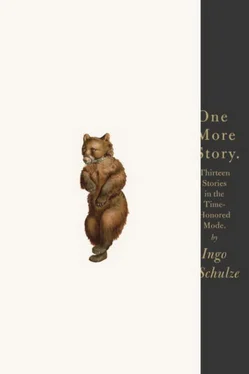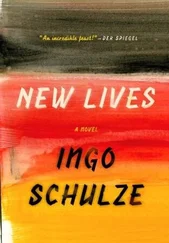I could get involved with Sheila with a clear conscience. But that was also the only advantage of having to live separated from the woman I loved, and my own daughter.
Sheila usually stands out because of her incredible hair and her vivacity, with its tinge of overexcitement. After flunking out of law school she worked in a notary’s office. A couple of weeks after my reading in Koblenz she had moved in with a girlfriend in Berlin and, against the odds, immediately found a job here. From then on we saw each other almost every day, and soon we were being invited everywhere as a couple. I did not, however, introduce Sheila to Anne, my daughter by Tanya.
Sheila was now reading nothing but Egyptian writers, and learning Arabic vocabulary every morning. I patched together a lecture from various texts, found the hook to hang it on in the relationship of the words “history/story” and Geschichte/Geschichten , and finished with the conversation between Alice and Humpty Dumpty in Lewis Carroll’s Through the Looking Glass , which implies that whoever has power also decides what words mean, which is why we storytellers, or so I planned to conclude, are so important. Because we …
I could see myself in a huge auditorium, with a horde of photographers thronging the space between the stage and the first row, heard myself say shokran —the word for “thank you” being the only word of Arabic I know — and felt myself being literally overwhelmed by the applause. I put my hand to my heart several times and bowed. Some people responded so enthusiastically they couldn’t stay in their seats.
With the help of Elisabeth, the librarian for the Goethe-Institut, who had smoothed the way for an Arabic translation of my Simple Stories , I arranged for readings at the university, the German high school, and the Goethe-Institut in both Cairo and Alexandria.
In early February — I hadn’t learned until the end of January that the conference would be held the last week of February — it dawned on me that there wouldn’t be much point in giving my speech in German. John Woods, who was sitting atop his packed possessions in San Diego, on the verge of a move to Berlin, translated the text in two days and wrote me a few encouraging words. Finally I spent an afternoon with Eleonore — nicknamed “Nörchen,” a friend of my mother’s who had grown up in South Africa — memorizing the correct pronunciation of the English words and a corresponding cadence for the sentences. The day before we were to depart I bought half a dozen German and Berlin calendars that I found on sale, as well as three smallish boxes of Mozart balls — prettily packaged chocolates are always well received. At KaDeWe I found three chunks of the Wall (the colorful ones) encased in Plexiglas for 6.90 euros apiece. People can laugh, or take this as a bit of self-irony on my part, but everyone who travels for business or an official tour knows how helpful such items are at that first encounter with one’s hosts. Nor do I wish to hide the fact that I have the occasional weak moment when I consider myself a good representative of my country — yes, why not, of Europe and the West.
On February 22 we flew Air France via Paris to Cairo. The music played in the plane before takeoff in both Berlin and Paris was, remarkably enough, an instrumental piece by Michaela Melian, the title track from a CD that I had given Sheila for Christmas. Sheila likewise thought that was a good omen. This was our first trip abroad together. Closing our eyes, we held hands on takeoff.
In Cairo, before we even reached passport control, we were greeted by two young men. Thanks to their presence as ambassadors of the conference, they claimed with some self-assurance, we would be able to have our passports checked right away, no visa necessary — which turned out not to be true. We had to go back and purchase a thirty-five-dollar visa that looked like a postage stamp — the pragmatism of a country with lots of tourists, said Elisabeth, who was waiting for us on the other side of passport control.
The warmth, of course, was a gift from heaven. After our edgy drowsiness on the plane, the few yards from the arrival hall to the parking lot sufficed to instill euphoria. The driver of a shiny silver VW bus, an older gentleman in a suit, opened the car doors for us, stowed our luggage, and then we glided out into the early evening traffic. Soldiers in dark blue uniforms and armed with shields and billy clubs stood in cordons along both curbs — awaiting President Mubarak. But we were soon driving along elevated roads, gazing down at Cairo, and getting used to the ubiquitous honking of car horns.
As darkness fell we arrived at our hotel. Sheila called our room a “suite,” since we had at our command both a living room and a bedroom, as well as a large bath. The view was blocked by the smoothly stuccoed wall of another high-rise, but far below we could see roofs with antennas. We left our bags unpacked and started off at once, made it hand in hand across a multilane road from which the hotel driveway diverged, and a minute later we were beside the Nile. We should walk along the Corniche, Elisabeth had suggested, to the Fish Market, a boat restaurant.
Not that I was unfamiliar with the term “corniche,” but all the same to my ears it sounded as remote and exotic as the words “Tuscany” or “Broadway” once had. And now I was leaning beside an energized Sheila on the railing of Cairo’s Corniche and watching the current as attentively as if a basket were floating there in the water. Neither the myriad boats draped with garlands of light, nor the hotel palaces on the far shore, and certainly not the streetlamps on the bridges and along the river-banks were able to illuminate the Nile. It flowed along wide and heavy under a gentle cover of darkness. We walked upstream, past a disco and restaurants with just a few customers. The young people strolling side by side — there was a good distance between streetlamps — never touched one another. When they spoke it looked as if they were explaining very serious matters, at least it didn’t look like chitchat. At one point Sheila stopped, hugged and kissed me, and said, “Thank you so much!”
We got the last available window table in the Fish Market. Silly of course, but it filled me with a certain pride to know that the river we were watching flow by beneath us was the Nile. And at the same time it seemed a kind of sacrilege, as if this were somehow presumptuous of us. Sheila pulled out her cell phone. “Mama,” she exclaimed. “Guess where I am?”
The buffet was an elongated mountain of ice cubes, in which lay the rarest and finest fish. You saw only the mouths of most of them, and the waiter in charge of the buffet had to dig deep and extract them for presentation to his guests. Sometimes he displayed the fish like a precious necklace draped between his hands, sometimes he held one in each hand like a balance scale. Once we had made our decision, the buffet waiter passed the “Egyptian fish” on to a chef and turned to his next guests. Sheila returned to the table. I waited a while but finally followed her — and was certain I had done something wrong. No one had given us a number or a chit. But no sooner had I taken my seat than our chosen fish were presented again for approval, our order was then repeated—“Yes, grilled, sir”—and served to us shortly thereafter, although we weren’t even close to having sampled all the appetizers.
On the way back to the hotel we bought mineral water in a little shop. A young man sitting on the steps smiled and pretended to tug at his hair, pointed then to my long hair, and called out, “Very nice, very nice!” I felt not just flattered but right at home.
The next morning began with a misunderstanding. We arrived at the foot of the hotel stairway at the agreed hour and kept an eye out for our silver VW bus. I waved off the offers of a steady stream of snail-paced taxis, and Sheila had to repeatedly assure the bellhops that we didn’t need one. When at twenty after ten still no VW bus had appeared, I called the Goethe-Institut. The driver, I learned, had also just phoned to ask where we were. Suddenly I heard my name being shouted from a battered old car, a Lada. We climbed in. The driver laid into us. He claimed he had been driving in circles for half an hour, that he wasn’t allowed to stop here — a no-parking zone. Sheila said he was lying, that we had been standing there for a good twenty minutes.
Читать дальше












